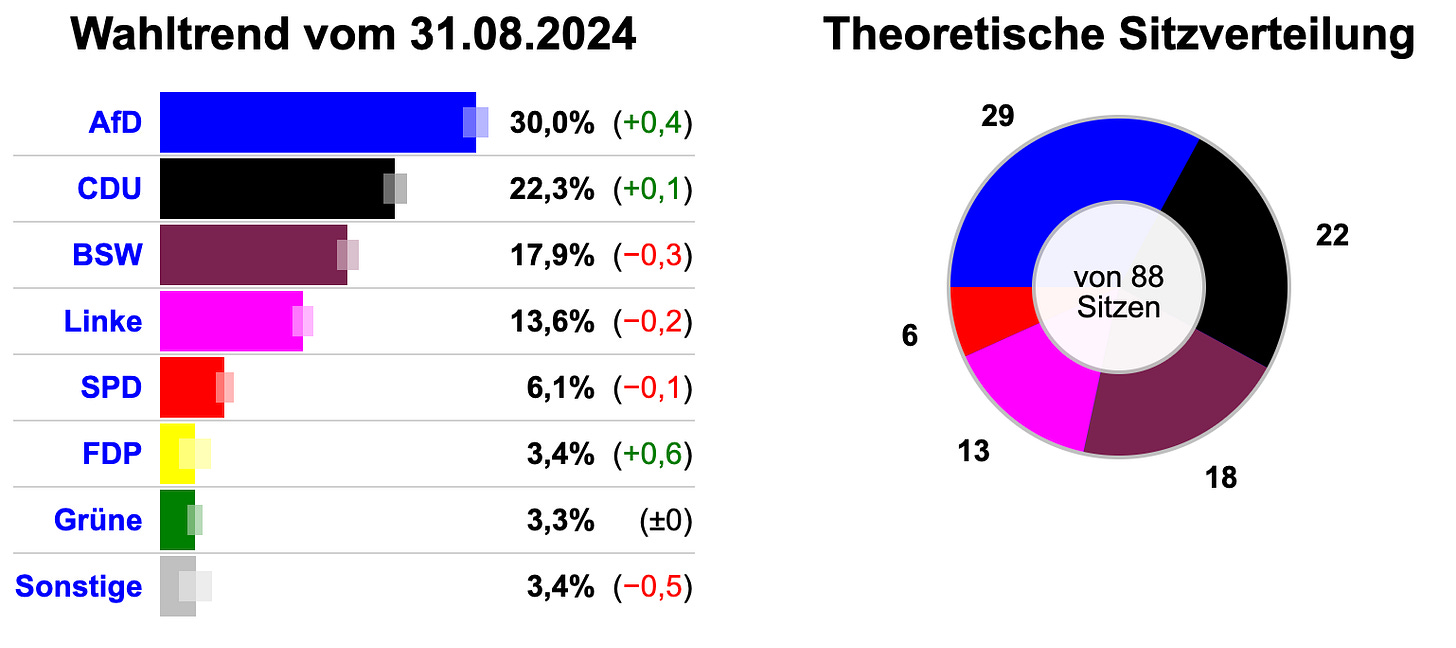EAST GERMAN ELECTIONS POST
“Coalition chaos looms in eastern Germany after state elections,” intones Der Standard. “Foreign countries are sounding the alarm,” says t-online. “Rightward shift predicted,” screams taz, following up with an ominous piece on “What the right will get up to.”
Yes indeed, the day has come that our rulers have long feared: Thüringen and Saxony are electing their new state parliaments. We will have initial results at 6pm, shortly after this post goes up. Please refresh for updates.
There is little doubt that Alternative für Deutschland will emerge from this election as the strongest party in Thüringen; the latest polls peg their support at 30%. The current ruling coalition, of the Left Party (Die Linke), the Social Democratic Party and the Greens is as good as doomed. The Greens probably won’t make it back into the Landtag, as they appear to be well short of the 5% minimum hurdle for representation:

In Saxony, on the other hand, the establishment may still squeak out another term. The latest polling there suggests that the present coalition of CDU, SPD and Greens may claim just enough seats to form a slim majority government:
There are three things to keep in mind ahead of the results:
1) The Bündnis Sahra Wagenknecht (BSW), or the Sahra Wagenknecht Alliance – which split off from Die Linke last year – commands broad support in both Thüringen and Saxony. Sahra Wagenknecht has ruled out any possibility that her party will cooperate with Alternative für Deutschland. She has also demanded that other potential coalition partners oppose the stationing of US mid-range rockets in Germany and further weapons deliveries to Ukraine. It is an attempt to leverage state politics for national foreign policy outcomes.
2) Barring serious intra-party political shifts, it is therefore unlikely that the AfD will enter government in either Thüringen or Saxony. That does not mean they will be powerless, though. In Thüringen, the question is whether the AfD will achieve enough seats in the Landtag to form a so-called blocking minority, or a Sperrminorität. Polls have them directly on the cusp of this crucial threshold. Everything that requires a two-thirds majority of parliament to decide – above all amendments to the state constitution and the election of state constitutional judges – would become impossible without the cooperation of an AfD with more than two-thirds of the parliamentary seats. Saxony distributes seats somewhat differently, making it less feasible for the AfD to achieve the same thing there, even though they’re polling about the same in both states.1
3) Beyond the AfD, the big question is what kind of governing coalitions will be possible, if the BSW won’t work with the CDU because of their anti-Antlanticism, and nobody including BSW will work with the AfD. There is, as I said, a good chance that the present CDU-SPD-Green coalition of Saxony survives this election, but Saxony will face a serious chance of political crisis if it doesn’t. The chances of crisis are even higher in Thüringen, where as I said the Left-SPD-Green coalition is done for.
UPDATE: The first prognoses are out. ZDF puts the Saxon election as follows …
… and the Thüringen election like this:
ARD have their own prognoses that look somewhat worse for AfD.
UPDATE 2: Current vote counts in Thüringen and Sachsen from state-media assholes at ZDF. AfD and CDU are fighting hard for first place in Saxony, with 31.4% and 31.7% respectively. AfD exceeding polls, ensuring political chaos and winning my heart in Thüringen with 33.2%.
Parties, in principle, must achieve a minimum of 5% support to win any representation in the Landtag of Thüringen or Saxony. Because a lot of votes are wasted on small parties that never meet this threshold, the AfD can come within striking distance of a one-third blocking minority with 30% of the votes, or even somewhat less. Saxony, however, has an important exception to the 5% rule: Parties with candidates that win multiple direct mandates can enter the state parliament even if they fail to meet the 5% hurdle. This makes things harder for the AfD there.






As an example of the increasing disappointment in the far left/Progressive/liberal (whatever you call it in your country; I'm in the US) trend of recent years, yesterday I was visiting with a friend who's been staunchly progressive/Democratic Party. She teaches at a prestigious prominent university. Without prompting, she confided to me how disappointed she is in Kamala Harris, especially the lack of substantive content offered by the campaign so far. Also, she knew someone who worked in the West wing of the White House, and a year ago my friend asked what they thought of Biden's mental capacity—getting no answer. But recently that person, who no longer works for the government, apologized for avoiding the question and said they had all been required to sign NDAs about it.
Never mind some of the woke horror stories she told me about her academic job these days.
60-plus percent of the world is having national elections this year. If you wonder why all the noises come from current politicians, it's called fear.